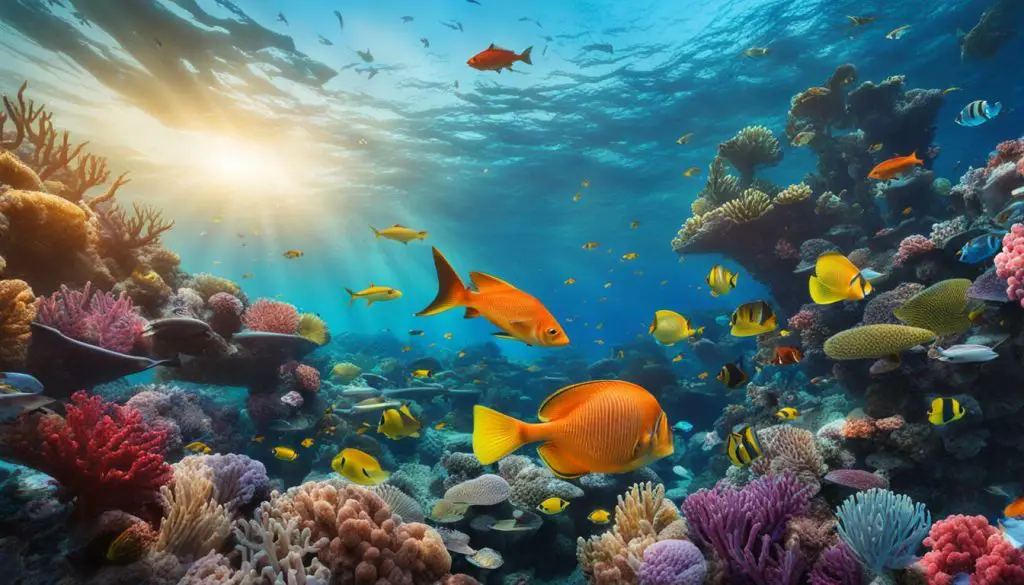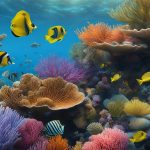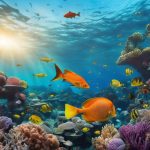Marine conservation refers to the protection and preservation of marine ecosystems and the species that inhabit them. It involves various efforts made by organizations and individuals to ensure the long-term sustainability of our valuable marine resources.
Marine conservation strategies aim to reduce the negative impacts of human activities on marine ecosystems, such as overfishing, habitat destruction, pollution, and climate change. By implementing effective conservation measures, we can preserve the health of our oceans and the creatures that call them home.

In this section, we will explore what marine conservation is, its significance, and the various efforts being made to ensure the sustainability of marine ecosystems.
Key Takeaways
- Marine conservation involves protecting and preserving marine ecosystems and species.
- Efforts are being made by organizations and individuals to ensure the long-term sustainability of marine resources.
- Conservation strategies aim to reduce the negative impacts of human activities on marine ecosystems.
- Overfishing, habitat destruction, pollution, and climate change pose significant threats to marine ecosystems.
- Effective conservation measures can preserve the health of our oceans and the creatures that call them home.
The Importance of Marine Conservation
Marine conservation is critical to the well-being of our planet. The oceans cover about 70% of the Earth's surface and play a significant role in regulating the climate. By preserving marine ecosystems, we can help regulate the atmosphere, stabilize the climate, and mitigate the impacts of natural disasters.
Marine conservation efforts also ensure that our planet's biodiversity is maintained. The oceans support millions of species, including those that provide food, medicine, and other natural resources. By protecting marine habitats, we can ensure the sustainability of these resources for future generations.
One of the greatest benefits of marine conservation is the preservation of cultural and recreational activities. The ocean is a source of inspiration, recreation, and relaxation for billions of people worldwide. By protecting this valuable resource, we are also protecting the livelihoods and traditional practices of coastal communities.
The Importance of Marine Conservation: Biodiversity Preservation
Marine conservation is crucial for the preservation of biodiversity. The oceans support millions of species, ranging from tiny plankton to massive whales. These species play a vital role in the planet's ecosystem, involving food webs, nutrient cycling, and carbon sequestration. Marine conservation efforts ensure that these species are protected and their numbers maintained, thereby contributing to the overall health of the planet.
The Importance of Marine Conservation: Climate Regulation
The oceans play a significant role in regulating the Earth's climate. They absorb heat and carbon dioxide from the atmosphere, thereby reducing the impacts of climate change. Marine conservation efforts ensure that marine ecosystems remain healthy and can continue to perform their climate-regulating functions. This is essential in mitigating the impacts of climate change and ensuring the long-term sustainability of the planet.
The Importance of Marine Conservation: Provision of Essential Resources
The oceans provide essential resources, including food, medicine, and minerals. Marine conservation efforts ensure that these resources are harvested sustainably, preserving them for future generations. This also helps to protect the livelihoods of coastal communities, many of whom depend on the ocean for their survival.
Methods of Marine Conservation
Marine conservation practices aim to preserve and protect marine ecosystems and the biodiversity they support. Various methods are employed to achieve this goal, including:
Protected Areas
One of the most effective marine conservation methods is the establishment of protected areas, such as marine reserves, national parks, and wildlife sanctuaries. These designated areas restrict or prohibit human activity and allow marine ecosystems to thrive without interference.
Sustainable Fishing Practices
Sustainable fishing practices are crucial for ensuring the long-term viability of fish populations and the health of marine ecosystems. These practices include responsible harvesting techniques, fishing quotas, and the use of environmentally friendly gear.
Marine Pollution Prevention
Marine pollution is a significant threat to marine ecosystems. To combat this, marine conservation practices involve preventing, reducing, and controlling the discharge of pollutants, including plastic waste, oil spills, and chemical runoff from land-based sources.
Restoration Initiatives
Marine conservation efforts also involve restoration initiatives, such as the reforestation of mangrove forests, the creation of artificial reefs, and the rehabilitation of damaged marine habitats.
By employing a combination of these methods, marine conservation practices can promote the sustainability and resilience of marine ecosystems.
Marine Conservation Organizations
Marine conservation organizations are non-profit entities that work towards preserving and protecting marine habitats and ecosystems. These organizations operate globally and focus on addressing the threats that the oceans face.
A few of the most prominent marine conservation organizations include:
| Organization Name | Initiatives |
|---|---|
| Ocean Conservancy | Trash Free Seas Alliance, International Coastal Cleanup, Gulf Restoration |
| World Wildlife Fund | Oceans and Coasts Program, Smart Fishing Initiative, Marine Protected Areas |
| The Nature Conservancy | Coral Reef Conservation, Sustainable Fishing, Blue Bonds for Ocean Conservation |
These organizations work collaboratively with individuals, governments, and businesses to implement conservation measures focused on reducing overfishing, protecting marine habitats, and preventing pollution.
By raising public awareness and fostering engagement, marine conservation organizations ensure that the oceans' importance and vulnerability are understood, and that immediate action is taken to safeguard their health.
Strategies for Marine Conservation
Marine conservation strategies involve a range of practices aimed at protecting and restoring marine ecosystems for their long-term sustainability. These strategies are essential in reducing the impact of human activities on marine life and maintaining a healthy balance in marine ecosystems.
Marine Spatial Planning
Marine spatial planning is a method that involves mapping the ocean's resources and dividing it into zones for different uses, such as fishing, shipping, recreation, and conservation. This helps in reducing conflicts and managing the use of resources sustainably. This strategy ensures that activities in one zone do not negatively affect another, and the marine environment is not impacted by human activity.
Ecosystem-based Management
Ecosystem-based management is a holistic approach to managing marine resources by considering the ecosystem as a whole rather than only one species. It involves identifying the relationships between species and their habitats, managing fishing levels, and reducing pollution levels to protect the ecosystem. By considering the entire ecosystem, this strategy ensures the long-term sustainability of all species and the health of the ecosystem.
Community Engagement
Community engagement involves involving local communities in the management of marine resources, and it is a vital strategy in marine conservation. Local communities are often the ones most affected by changes in the marine environment and have a wealth of knowledge on the local ecosystem. Involving them in decision-making processes ensures that their needs and values are considered and that they are invested in the conservation of the marine environment.
Enforcement of Laws and Regulations
The enforcement of laws and regulations is another critical strategy for marine conservation. Governments enact laws and regulations to protect the marine environment, and enforcing these laws is essential in ensuring compliance. This includes tackling illegal fishing practices, preventing marine pollution, and safeguarding critical marine habitat areas. Consistent enforcement of these laws and regulations helps in achieving marine conservation goals.
Overall, the success of marine conservation efforts depends on the effective implementation of a combination of strategies. Through the use of marine spatial planning, ecosystem-based management, community engagement, and enforcement of laws and regulations, we can ensure the long-term sustainability of our marine resources.
Impact of Marine Conservation
Effective marine conservation efforts have a positive impact on the environment, economy, and society. By preserving and protecting marine habitats, we can maintain biodiversity, promote sustainable fishing practices, and safeguard essential resources. In turn, this ensures the long-term sustainability of our oceans and marine ecosystems.
One of the most significant benefits of marine conservation is the preservation of biodiversity. Marine habitats are home to a diverse range of species, many of which are unique to these ecosystems. By protecting these habitats, we can safeguard the survival of threatened and endangered species and maintain the balance of marine food chains.
Marine conservation also promotes sustainable fishing practices, which are essential for ensuring the long-term viability of fish stocks. By managing fisheries sustainably, we can prevent overfishing, reduce bycatch, and protect vulnerable species. This, in turn, promotes healthy fish populations, maintains the health of marine ecosystems and supports coastal communities whose livelihoods depend on fishing.
Furthermore, marine conservation efforts provide numerous benefits to society, including the provision of essential resources such as food, medicine, and energy. Healthy marine ecosystems contribute significantly to the global economy and provide employment opportunities in fishing, tourism, and other industries.
The positive impact of marine conservation is evident in success stories and case studies, such as the recovery of humpback whales in the North Pacific and the restoration of oyster reefs in the Chesapeake Bay. These examples demonstrate the significant benefits of effective conservation efforts and highlight the potential for future success through continued conservation measures.
Overall, marine conservation efforts have a profound impact on the environment, economy, and society. Through effective management strategies and collaborative efforts, we can ensure the long-term sustainability of our oceans and marine resources, providing numerous benefits for generations to come.
Challenges in Marine Conservation
Despite the efforts of marine conservation organizations and the implementation of various strategies, there are significant challenges that remain in the field of marine conservation. These challenges threaten the sustainability of marine ecosystems and require collaborative solutions.
Overfishing
One of the major challenges in marine conservation is overfishing, which not only depletes fish populations but also disrupts the balance of marine ecosystems. Illegal and unregulated fishing practices further complicate the issue, making it difficult to enforce regulations and protect vulnerable species.
Habitat Destruction
Habitat destruction, such as the destruction of coral reefs and wetlands, poses a significant challenge to marine conservation efforts. This can occur due to human activities, such as coastal development and pollution, as well as natural disasters such as hurricanes and storms.
Pollution
Marine pollution, particularly from plastic waste and chemical contamination, poses a significant threat to marine ecosystems and the health of marine organisms. This requires urgent action to prevent further pollution and implement responsible waste management practices.
Climate Change
Climate change and ocean acidification have significant impacts on marine ecosystems, including coral bleaching, changes in ocean currents, and altered species distributions. Addressing climate change requires global action and collaboration to reduce greenhouse gas emissions and limit the impact of this challenge on marine life.
Innovations in Marine Conservation
In recent years, there have been significant technological advancements and innovative approaches to aid marine conservation efforts.
Data Analysis
One of the most promising innovations in marine conservation is the use of data analysis. With improved technology and data collection methods, scientists can now analyze vast amounts of data to better understand marine ecosystems and the impact of human activities. This can help identify areas that need protection and track the effectiveness of conservation efforts.
Artificial Reefs
Artificial reefs are another innovative approach to marine conservation. These man-made structures are designed to mimic natural reefs and provide habitats for a variety of marine species. They can also help reduce pressure on natural reefs, which are already under significant stress due to climate change and other human activities.
Sustainable Aquaculture Practices
Sustainable aquaculture practices are becoming increasingly popular as a way to meet the growing demand for seafood without putting additional strain on wild fish populations. By farming fish in a responsible and sustainable manner, we can reduce the impact of fishing on marine ecosystems and help ensure their long-term viability.
These are just a few examples of the innovative approaches and technological advancements that are aiding marine conservation efforts. By embracing new ideas and technologies, we can continue to make progress in protecting our oceans and the valuable marine resources they provide.
Future of Marine Conservation
As we move forward, it is essential to recognize the critical role that marine conservation organizations play in protecting our oceans and marine life. These organizations are instrumental in raising awareness, implementing conservation measures, and advocating for sustainable marine practices.
However, despite their efforts, the future of marine conservation remains uncertain. Climate change, pollution, and overfishing continue to threaten our oceans and marine ecosystems.
It is crucial for organizations to remain adaptable and innovative, utilizing emerging technologies and incorporating new approaches into their conservation practices.
In addition to the efforts of organizations, the benefits of marine conservation must also be communicated to the wider public. The public must understand that the preservation of our oceans goes beyond environmental concerns and encompasses economic, social, and cultural benefits as well.
Ultimately, the future of marine conservation relies on our collective efforts to prioritize sustainability and protect our valuable marine resources.
Promoting Public Awareness and Action
Marine conservation efforts rely not only on the actions of organizations and governments but also on the participation of individuals. Promoting public awareness of the importance of marine conservation is crucial in ensuring the sustainability of marine resources. Here are some marine conservation initiatives that individuals can engage in:
- Reduce plastic use: Plastic pollution is a major threat to marine life. Individuals can reduce plastic waste by using reusable bags, water bottles, and containers, and by avoiding single-use plastics such as straws and utensils.
- Participate in citizen science projects: Citizen science projects allow individuals to contribute to scientific research and conservation efforts. Projects such as monitoring marine species and tracking plastic pollution levels provide valuable data to researchers.
- Support sustainable seafood: Choosing sustainably caught or farmed seafood can reduce overfishing and support sustainable fishing practices. Look for seafood that is certified by organizations such as the Marine Stewardship Council or the Aquaculture Stewardship Council.
- Advocate for marine conservation: Individuals can make a difference by advocating for marine conservation efforts in their communities. This can include contacting local officials, supporting conservation organizations, and spreading awareness through social media and educational campaigns.
By taking these small steps, individuals can contribute to larger marine conservation efforts and help protect the health and well-being of our oceans for future generations.
Conclusion
Marine conservation is vital to the preservation of our oceans and marine ecosystems. It is essential to protect the biodiversity, regulate climate, and sustainably manage our marine resources. The efforts of dedicated organizations and the implementation of effective strategies have proven to be successful in preserving marine habitats and restoring degraded ones.
However, marine conservation faces several challenges, including overfishing, habitat destruction, pollution, and climate change. These complex issues require collaborative solutions that require the involvement of the public and all stakeholders to promote sustainable practices.
Innovative approaches and technological advancements have aided conservation efforts, providing new opportunities for sustainable resource management. Continued conservation efforts and public awareness are essential for the long-term sustainability of our valuable marine resources.
Protecting Our Oceans for Generations to Come
Together, we can protect and restore the health of our oceans for generations to come. Promoting public awareness of marine conservation initiatives, engaging in citizen science projects, or choosing sustainable seafood are simple actions that individuals can take to contribute to the cause.
By working together, we can ensure that marine conservation efforts continue to be effective and make a significant impact on preserving marine ecosystems and the planet as a whole.
FAQ
What is marine conservation?
Marine conservation refers to the protection and preservation of marine ecosystems and species in order to maintain their health and sustainability. It involves efforts to prevent habitat destruction, overfishing, pollution, and other threats that can negatively impact marine life.
Why is marine conservation important?
Marine conservation is crucial because it helps maintain the balance of marine ecosystems, preserves biodiversity, and ensures the availability of essential resources. It also contributes to climate regulation, shoreline protection, and supports economic activities such as tourism and fisheries.
What methods are used in marine conservation?
Various methods and practices are employed in marine conservation, including the establishment of protected areas, implementation of sustainable fishing practices, prevention of marine pollution, and restoration initiatives to rehabilitate damaged ecosystems.
Which organizations are involved in marine conservation?
There are several prominent marine conservation organizations dedicated to protecting marine habitats and species. Examples include the World Wildlife Fund (WWF), Greenpeace, Conservation International, and The Ocean Foundation. These organizations work towards raising awareness, implementing conservation measures, and advocating for sustainable practices.
What are the strategies used in marine conservation?
Strategies for marine conservation include marine spatial planning, ecosystem-based management, and community engagement. These approaches aim to ensure the sustainable management of marine resources by considering ecological, social, and economic factors.
What impact does marine conservation have?
Effective marine conservation efforts have positive impacts on the environment, economy, and society. They help preserve biodiversity, support sustainable fisheries, protect coastal areas from erosion, and contribute to the overall well-being of coastal communities.
What are the challenges in marine conservation?
Marine conservation faces challenges such as overfishing, habitat destruction, pollution, and climate change. These issues require collaborative solutions and efforts from various stakeholders to address and mitigate their impacts on marine ecosystems.
What innovations are aiding marine conservation?
Innovations in marine conservation include the use of data analysis to improve understanding and management of marine ecosystems, the creation of artificial reefs to restore habitats, and the development of sustainable aquaculture practices that reduce the ecological footprint of fish farming.
What does the future hold for marine conservation?
The future of marine conservation depends on continued efforts from organizations, individuals, and governments. It involves adapting to new challenges, addressing emerging threats, and implementing effective strategies to ensure the long-term sustainability of the oceans and marine life.
How can individuals contribute to marine conservation?
Individuals can contribute to marine conservation by supporting marine conservation organizations, practicing sustainable fishing and boating, reducing plastic waste, and promoting awareness about the importance of marine ecosystems. They can also participate in citizen science projects and beach clean-ups to actively engage in conservation efforts.
Latest Posts
- Royal Windermere Yacht Club Review
 Did you know Lake Windermere is England's biggest lake? It's 10.5 miles long and 1 mile wide. This beautiful lake is home to the famous Royal Windermere Yacht Club. It's one of the UK's top sailing clubs, making it a great spot for sailing fans and those who love being on the water. The Royal… Read more: Royal Windermere Yacht Club Review
Did you know Lake Windermere is England's biggest lake? It's 10.5 miles long and 1 mile wide. This beautiful lake is home to the famous Royal Windermere Yacht Club. It's one of the UK's top sailing clubs, making it a great spot for sailing fans and those who love being on the water. The Royal… Read more: Royal Windermere Yacht Club Review - Coquet Yacht Club Review
 Welcome to the Coquet Yacht Club in Amble, UK. It's known for its yachting community and great marina. Also, see why this club is so well-loved. The Coquet Yacht Club has over 500 members who love boating. They come from many different backgrounds but share a passion for sailing. This club has a long history… Read more: Coquet Yacht Club Review
Welcome to the Coquet Yacht Club in Amble, UK. It's known for its yachting community and great marina. Also, see why this club is so well-loved. The Coquet Yacht Club has over 500 members who love boating. They come from many different backgrounds but share a passion for sailing. This club has a long history… Read more: Coquet Yacht Club Review - Coniston Sailing Club Review
 Did you know about the Coniston Sailing Club in the stunning Lake District? It offers many services and activities for all sailing lovers. The club's beautiful location and great facilities make it a top pick for sailing in the UK. At Coniston Sailing Club, you can learn to sail, hire a boat, or join fun… Read more: Coniston Sailing Club Review
Did you know about the Coniston Sailing Club in the stunning Lake District? It offers many services and activities for all sailing lovers. The club's beautiful location and great facilities make it a top pick for sailing in the UK. At Coniston Sailing Club, you can learn to sail, hire a boat, or join fun… Read more: Coniston Sailing Club Review - St Andrews Sailing Club Review
 Did you know sailing is growing fast in the UK? More people are discovering the joy of sailing. If you love sailing or want to learn, check out St Andrews Sailing Club. The club has something for everyone. From beginners to experts, you can learn and have fun. Their instructors teach you everything about sailing… Read more: St Andrews Sailing Club Review
Did you know sailing is growing fast in the UK? More people are discovering the joy of sailing. If you love sailing or want to learn, check out St Andrews Sailing Club. The club has something for everyone. From beginners to experts, you can learn and have fun. Their instructors teach you everything about sailing… Read more: St Andrews Sailing Club Review - Derwent Reservoir Sailing Club Review
 Did you know that Derwent Reservoir in Northumberland is famous for both calm walks and exciting water sports? The Derwent Reservoir Sailing Club is loved by many. Families, water sports fans, and those who love adventure come here. The club is in Blanchland, Consett, a nice place for all. Imagine paddle boarding, dinghy sailing, windsurfing,… Read more: Derwent Reservoir Sailing Club Review
Did you know that Derwent Reservoir in Northumberland is famous for both calm walks and exciting water sports? The Derwent Reservoir Sailing Club is loved by many. Families, water sports fans, and those who love adventure come here. The club is in Blanchland, Consett, a nice place for all. Imagine paddle boarding, dinghy sailing, windsurfing,… Read more: Derwent Reservoir Sailing Club Review - Loch Venachar Sailing Club Review
 Welcome to Loch Venachar Sailing Club, an exciting place! Loch Venachar is in the Trossachs National Park, a top spot in the Scottish Highlands for sailing fans. This club teems with beautiful sights and fun activities, making it a perfect spot for all. Join in the fun at Loch Venachar Sailing Club with sailing lessons… Read more: Loch Venachar Sailing Club Review
Welcome to Loch Venachar Sailing Club, an exciting place! Loch Venachar is in the Trossachs National Park, a top spot in the Scottish Highlands for sailing fans. This club teems with beautiful sights and fun activities, making it a perfect spot for all. Join in the fun at Loch Venachar Sailing Club with sailing lessons… Read more: Loch Venachar Sailing Club Review - Cardwell Bay Sailing Club Review
 Did you know that sailing is not just thrilling, but also helps you see the coast's beauty? It is well-loved by water lovers around the world. Cardwell Bay Sailing Club is here for you, offering amazing sailing adventures. The club is at the gorgeous Cardwell Bay marina. It's perfect for beginners and experienced sailors alike.… Read more: Cardwell Bay Sailing Club Review
Did you know that sailing is not just thrilling, but also helps you see the coast's beauty? It is well-loved by water lovers around the world. Cardwell Bay Sailing Club is here for you, offering amazing sailing adventures. The club is at the gorgeous Cardwell Bay marina. It's perfect for beginners and experienced sailors alike.… Read more: Cardwell Bay Sailing Club Review - Clyde Corinthian Yacht Club Review
 Did you know the Clyde Corinthian Yacht Club is over 140 years old? Since 1877, this club on the west coast of Scotland has welcomed sailing fans. It's a place where both new and experienced sailors come together. The club is known worldwide for its excellence in sailing. The club has great facilities like a… Read more: Clyde Corinthian Yacht Club Review
Did you know the Clyde Corinthian Yacht Club is over 140 years old? Since 1877, this club on the west coast of Scotland has welcomed sailing fans. It's a place where both new and experienced sailors come together. The club is known worldwide for its excellence in sailing. The club has great facilities like a… Read more: Clyde Corinthian Yacht Club Review - Ullswater Yacht Club Review
 The Lake District isn't just about beautiful views. It's also a top place for sailing. Ullswater Yacht Club brings together sailing fans to enjoy the calm and excitement of sailing. It sits in the lovely Lake District. Here, you can join regattas, rent boats, or take sailing classes. This club is known for its great… Read more: Ullswater Yacht Club Review
The Lake District isn't just about beautiful views. It's also a top place for sailing. Ullswater Yacht Club brings together sailing fans to enjoy the calm and excitement of sailing. It sits in the lovely Lake District. Here, you can join regattas, rent boats, or take sailing classes. This club is known for its great… Read more: Ullswater Yacht Club Review - Prestwick Sailing Club Review
 Did you know over 1.5 million people in the UK love sailing and water sports? Among these, Prestwick Sailing Club is a top choice. It's on the beautiful Ayrshire coast. Here, you can enjoy various activities, no matter your skill level. The club offers sailing lessons, boat rentals, and a great clubhouse. It also hosts… Read more: Prestwick Sailing Club Review
Did you know over 1.5 million people in the UK love sailing and water sports? Among these, Prestwick Sailing Club is a top choice. It's on the beautiful Ayrshire coast. Here, you can enjoy various activities, no matter your skill level. The club offers sailing lessons, boat rentals, and a great clubhouse. It also hosts… Read more: Prestwick Sailing Club Review - Clyde Cruising Club Review
 Did you know the Clyde Cruising Club started in 1909? It's one of Scotland's most respected sailing clubs in Scotland. For over a century, it has been central to the area's boating history and known for its wonderful sailing experiences. In the lively city of Glasgow, the Clyde Cruising Club is a key point for… Read more: Clyde Cruising Club Review
Did you know the Clyde Cruising Club started in 1909? It's one of Scotland's most respected sailing clubs in Scotland. For over a century, it has been central to the area's boating history and known for its wonderful sailing experiences. In the lively city of Glasgow, the Clyde Cruising Club is a key point for… Read more: Clyde Cruising Club Review - Dalgety Bay Sailing Club Review
 On the north shore of the Firth of Forth, about three miles east of the Forth Rail Bridge, you'll find Dalgety Bay Sailing Club nestled in its own spacious coastal area with a convenient high tide access harbour. The WyndDalgety BayDunfermlineFifeKY11 9SJ Author John Sixthsmith I'm a freelance writer and avid sailor who loves to… Read more: Dalgety Bay Sailing Club Review
On the north shore of the Firth of Forth, about three miles east of the Forth Rail Bridge, you'll find Dalgety Bay Sailing Club nestled in its own spacious coastal area with a convenient high tide access harbour. The WyndDalgety BayDunfermlineFifeKY11 9SJ Author John Sixthsmith I'm a freelance writer and avid sailor who loves to… Read more: Dalgety Bay Sailing Club Review - Royal Forth Yacht Club Review
 The Royal Forth Yacht Club is a well-established water-sports club with over 150 years of history. Located in Granton Harbour near Edinburgh, the Club offers easy access to the beautiful sailing waters of the Firth of Forth. Members can participate in a variety of racing and cruising activities, with access to fully serviced moorings and… Read more: Royal Forth Yacht Club Review
The Royal Forth Yacht Club is a well-established water-sports club with over 150 years of history. Located in Granton Harbour near Edinburgh, the Club offers easy access to the beautiful sailing waters of the Firth of Forth. Members can participate in a variety of racing and cruising activities, with access to fully serviced moorings and… Read more: Royal Forth Yacht Club Review - Port Edgar Yacht Club Review
 Port Edgar Yacht Club is situated in South Queensferry, near the iconic Forth Bridges, making it easily accessible within a 60-minute drive for most individuals in the Central Belt. Whether you are new to the area, have recently completed an RYA course, or simply wish to return to sailing, they are there to assist you.… Read more: Port Edgar Yacht Club Review
Port Edgar Yacht Club is situated in South Queensferry, near the iconic Forth Bridges, making it easily accessible within a 60-minute drive for most individuals in the Central Belt. Whether you are new to the area, have recently completed an RYA course, or simply wish to return to sailing, they are there to assist you.… Read more: Port Edgar Yacht Club Review - Cramond Boat Club Review
 The Cramond Boat Club is located at the mouth of the River Almond, just four miles from the bustling centre of Edinburgh. Our Clubhouse and moorings provide a welcoming home for a variety of small craft, from dinghies to small cruisers and motorboats. The River Almond offers tidal access to the Firth of Forth for… Read more: Cramond Boat Club Review
The Cramond Boat Club is located at the mouth of the River Almond, just four miles from the bustling centre of Edinburgh. Our Clubhouse and moorings provide a welcoming home for a variety of small craft, from dinghies to small cruisers and motorboats. The River Almond offers tidal access to the Firth of Forth for… Read more: Cramond Boat Club Review - Discover Dinghy Sailing Holidays Adventure!
 Are you ready for an unforgettable vacation experience? Imagine gliding across crystal-clear waters, feeling the wind in your hair, and exploring hidden coves and breath-taking coastlines. Dinghy sailing holidays offer a unique adventure that brings together the thrill of sailing with the serenity of being surrounded by nature. But what exactly are dinghy sailing holidays… Read more: Discover Dinghy Sailing Holidays Adventure!
Are you ready for an unforgettable vacation experience? Imagine gliding across crystal-clear waters, feeling the wind in your hair, and exploring hidden coves and breath-taking coastlines. Dinghy sailing holidays offer a unique adventure that brings together the thrill of sailing with the serenity of being surrounded by nature. But what exactly are dinghy sailing holidays… Read more: Discover Dinghy Sailing Holidays Adventure! - Experience the Majesty: Sailing Alaska Adventures
 Are you ready to set sail and discover the untamed beauty of Alaska? Have you ever wondered what it's like to navigate through icy fjords, witness breathtaking wildlife, and experience the thrill of the open sea in one of the most awe-inspiring destinations on Earth? Get ready for an unforgettable adventure as we take you… Read more: Experience the Majesty: Sailing Alaska Adventures
Are you ready to set sail and discover the untamed beauty of Alaska? Have you ever wondered what it's like to navigate through icy fjords, witness breathtaking wildlife, and experience the thrill of the open sea in one of the most awe-inspiring destinations on Earth? Get ready for an unforgettable adventure as we take you… Read more: Experience the Majesty: Sailing Alaska Adventures - Set Sail on Learn to Sail Holidays Adventure
 Are you ready to embark on an unforgettable adventure and discover the thrill of sailing? Imagine mastering the art of navigating the open waters while exploring breathtaking destinations around the world. Whether you're a beginner or have some sailing experience, learn to sail holidays offer the perfect opportunity to embark on a new voyage of… Read more: Set Sail on Learn to Sail Holidays Adventure
Are you ready to embark on an unforgettable adventure and discover the thrill of sailing? Imagine mastering the art of navigating the open waters while exploring breathtaking destinations around the world. Whether you're a beginner or have some sailing experience, learn to sail holidays offer the perfect opportunity to embark on a new voyage of… Read more: Set Sail on Learn to Sail Holidays Adventure - Greek Sailing Holidays – Unwind on the Aegean
 Have you ever dreamed of sailing through the turquoise waters of the Aegean Sea, exploring the enchanting Greek islands at your own pace? Picture yourself immersing in the captivating beauty of hidden coves, basking in the warm Mediterranean sun, and experiencing the rich cultural heritage that Greece has to offer. Well, it's time to turn… Read more: Greek Sailing Holidays – Unwind on the Aegean
Have you ever dreamed of sailing through the turquoise waters of the Aegean Sea, exploring the enchanting Greek islands at your own pace? Picture yourself immersing in the captivating beauty of hidden coves, basking in the warm Mediterranean sun, and experiencing the rich cultural heritage that Greece has to offer. Well, it's time to turn… Read more: Greek Sailing Holidays – Unwind on the Aegean - Understanding What Are Marine Conservation Areas: A Guide
 Marine conservation areas are protected ocean spaces designated to preserve marine environments and their inhabitants. These areas are established to help regulate human activities and promote sustainable practices that maintain the health and productivity of ocean ecosystems. Marine conservation areas play a crucial role in preserving marine biodiversity and protecting vulnerable species. By designating specific… Read more: Understanding What Are Marine Conservation Areas: A Guide
Marine conservation areas are protected ocean spaces designated to preserve marine environments and their inhabitants. These areas are established to help regulate human activities and promote sustainable practices that maintain the health and productivity of ocean ecosystems. Marine conservation areas play a crucial role in preserving marine biodiversity and protecting vulnerable species. By designating specific… Read more: Understanding What Are Marine Conservation Areas: A Guide - Exploring Success Stories with Marine Conservation: Key Insights
 In recent years, marine conservation efforts have gained significant momentum, with organizations and individuals around the world taking action to restore the health of our oceans and protect marine life. In this article, we will delve into inspiring examples of marine conservation and showcase successful marine conservation projects through case studies and real-life stories. We… Read more: Exploring Success Stories with Marine Conservation: Key Insights
In recent years, marine conservation efforts have gained significant momentum, with organizations and individuals around the world taking action to restore the health of our oceans and protect marine life. In this article, we will delve into inspiring examples of marine conservation and showcase successful marine conservation projects through case studies and real-life stories. We… Read more: Exploring Success Stories with Marine Conservation: Key Insights - Solutions Explored: What Can We Do About Marine Conservation
 Our oceans are essential for sustaining life on our planet, providing us with food, oxygen, and regulating our climate. However, our oceans face numerous threats such as overfishing, climate change, and pollution, which jeopardize the health and survival of marine life and the overall ecosystem. It's time we take action to protect our oceans and… Read more: Solutions Explored: What Can We Do About Marine Conservation
Our oceans are essential for sustaining life on our planet, providing us with food, oxygen, and regulating our climate. However, our oceans face numerous threats such as overfishing, climate change, and pollution, which jeopardize the health and survival of marine life and the overall ecosystem. It's time we take action to protect our oceans and… Read more: Solutions Explored: What Can We Do About Marine Conservation - Discover Who is the Father of Marine Conservation Today
 Environmental preservation has become a pressing issue in recent times, with marine conservation at the forefront of efforts to protect our oceans and marine life. It is only through the tireless efforts of pioneers, trailblazers, and visionaries that we have come to understand the critical importance of preserving our planet's marine ecosystems. In this section,… Read more: Discover Who is the Father of Marine Conservation Today
Environmental preservation has become a pressing issue in recent times, with marine conservation at the forefront of efforts to protect our oceans and marine life. It is only through the tireless efforts of pioneers, trailblazers, and visionaries that we have come to understand the critical importance of preserving our planet's marine ecosystems. In this section,… Read more: Discover Who is the Father of Marine Conservation Today - Understanding What Are Marine Conservation Zones: A Guide
 Marine ecosystems cover more than two-thirds of our planet and are an essential part of our lives. They provide us with food, oxygen, and countless other resources. However, human activities such as overfishing, pollution, and habitat destruction have put immense pressure on these ecosystems, threatening their health and sustainability. To address these issues, marine conservation… Read more: Understanding What Are Marine Conservation Zones: A Guide
Marine ecosystems cover more than two-thirds of our planet and are an essential part of our lives. They provide us with food, oxygen, and countless other resources. However, human activities such as overfishing, pollution, and habitat destruction have put immense pressure on these ecosystems, threatening their health and sustainability. To address these issues, marine conservation… Read more: Understanding What Are Marine Conservation Zones: A Guide - Understanding What is Marine Conservation: A Quick Guide
 Marine conservation refers to the protection and preservation of marine ecosystems and the species that inhabit them. It involves various efforts made by organizations and individuals to ensure the long-term sustainability of our valuable marine resources. Marine conservation strategies aim to reduce the negative impacts of human activities on marine ecosystems, such as overfishing, habitat… Read more: Understanding What is Marine Conservation: A Quick Guide
Marine conservation refers to the protection and preservation of marine ecosystems and the species that inhabit them. It involves various efforts made by organizations and individuals to ensure the long-term sustainability of our valuable marine resources. Marine conservation strategies aim to reduce the negative impacts of human activities on marine ecosystems, such as overfishing, habitat… Read more: Understanding What is Marine Conservation: A Quick Guide


























